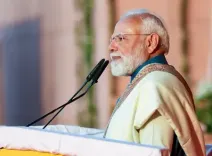Did the Delhi HC Validate Divorce Due to Constant Verbal Abuse by Wife?

Synopsis
Key Takeaways
- Delhi HC supports divorce decree for severe mental cruelty.
- Verbal abuse can be grounds for legal separation.
- Text messages deemed valid evidence in court.
- Judicial recognition of emotional distress in marriages.
- Two wrongs do not justify ongoing abuse.
New Delhi, Oct 24 (NationPress) The Delhi High Court has affirmed a divorce decree issued to an attorney against his spouse, determining that her consistent verbal abuse and insulting messages constituted “severe mental cruelty.”
A panel comprising Justices Anil Kshetrapal and Harish Vaidyanathan Shankar rejected the wife's challenge to the Family Court's 2023 ruling that had annulled their marriage under Section 13(1)(ia) of the Hindu Marriage Act, 1955.
The Justice Kshetrapal-led panel stated that the wife's actions, including sending abusive texts that undermined her husband's legitimacy and insulted his mother, inflicted “grave mental distress.” “The most compelling evidence comprises the series of text messages sent from the Appellant’s mobile number… which contained vile, derogatory and scandalous language,” it noted.
“Specific messages dated 09.05.2011, 15.05.2011, and 27.06.2011, which included terms such as ‘bastard’, ‘son of a bitch,’ and suggestions that his mother should ‘earn through prostitution’, are by themselves sufficient to constitute mental cruelty of the gravest kind,” the Delhi High Court added.
Dismissive of the wife's claim that the husband must have sent those messages to himself from her phone, the Justice Kshetrapal-led panel deemed that explanation “inherently improbable” and an “afterthought.”
It stated: “The appellant’s assertion that the respondent (husband) must have sent these messages to himself from her phone is inherently improbable and was rightly dismissed by the learned Family Court as an afterthought, particularly since this defense was never presented in the written statement and no corroborative evidence was provided.”
“Words and communications of the sort proved in this case are not innocuous,” the Delhi High Court remarked, stressing that the Family Court had accurately regarded them as “causing grave mental agony to the respondent (husband).” “The appellant (wife) routinely employed derogatory terms like ‘janwar’, ‘son of a bitch’, ‘haramzada’, ‘kutta’, and ‘kamina’ in daily conversations,” the Justice Kshetrapal-led panel recorded.
“She slapped the respondent (husband) merely for expressing a desire to accompany her to Mumbai… and from the outset of the marriage, denied conjugal relations,” it continued. The Delhi High Court concurred with the Family Court that the marriage had “irretrievably broken down,” noting that the couple had been living apart for over 14 years.
While acknowledging that the husband's behavior in filing multiple complaints was “not entirely desirable,” the Delhi High Court maintained that “two wrongs do not make a right.” “Such conduct by the Respondent (husband) could not justify or erase the independently established cruelty inflicted by the appellant (wife) through her unabashed verbal and textual abuse,” the Justice Kshetrapal-led panel concluded.
In dismissing the wife's appeal, the Delhi High Court stated: “We find no merit in the present appeal. The Family Court’s decision to grant a decree of divorce on the ground of cruelty is based on a cogent and balanced appreciation of the evidence and a correct application of legal principles.”










